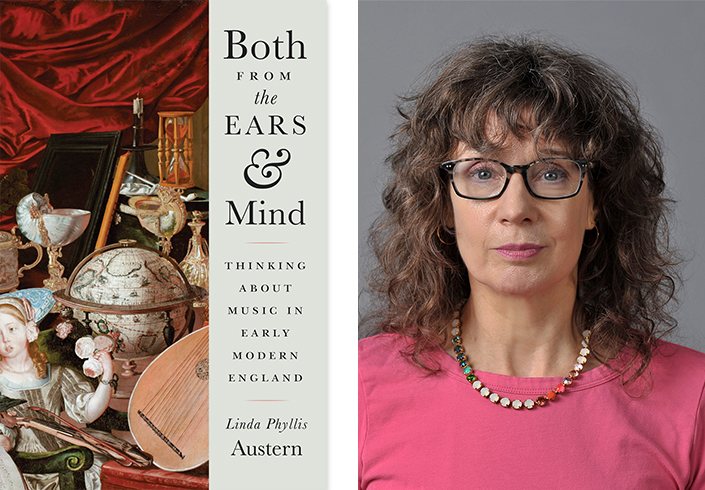Linda Austern, Bienen School professor of musicology, has been named the winner of the 2021 Diana McVeagh Prize for her most recent monograph, Both From the Ears and Mind: Thinking About Music in Early Modern England (University of Chicago Press, 2020).
The North American British Music Studies Association (NABMSA) awards the biennial Diana McVeagh Prize in recognition of the best book on British music. The prize is named in honor of pioneering British music writer, Diana McVeagh.
Austern was also recently awarded a lifetime honorary membership in NABMSA for her significant contributions to the organization and to the study of British music. A nomination letter stated: “Working on the canvass of early modern England, [Austern] has, with great artistry, transformed the picture of music in performance, and in how it was presented and experienced in a domestic space.” Another commented: “At a time when musicology still tended strongly towards narrow perspectives and insular narratives, Linda’s early articles … broke boundaries in their vivid depiction of the ‘hidden’ world of female music-making and the social and religious mores governing musical practice in sixteenth- and early seventeenth-century England.”
About the Book
Both from the Ears and Mind offers a bold new understanding of the intellectual and cultural position of music in Tudor and Stuart England. Austern brings to life the kinds of educated writings and debates that surrounded musical performance, and the remarkable ways in which English people understood music to inform other endeavors, from astrology and self-care to divinity and poetics.
Music was considered both art and science, and discussions of music and musical terminology provided points of contact between otherwise discrete fields of human learning. This book demonstrates how knowledge of music permitted individuals to both reveal and conceal membership in specific social, intellectual, and ideological communities.
Attending to materials that go beyond music’s conventional limits, these chapters probe the role of music in commonplace books, health-maintenance and marriage manuals, rhetorical and theological treatises, and mathematical dictionaries. Ultimately, Austern illustrates how music was an indispensable frame of reference that became central to the fabric of life during a time of tremendous intellectual, social, and technological change.
About Linda Austern
Linda Phyllis Austern is a specialist in Western European, and especially English, music of the sixteenth, seventeenth, and early eighteenth centuries. Her expertise includes the intersections between music and the visual arts, gender and sexuality, natural philosophy, and the Shakespearean theater.
She is the author of Music in English Children's Drama of the Later Renaissance (1994) and Both From the Ears and Mind: Thinking About Music in Early Modern England (2020). She has edited Music, Sensation, and Sensuality (2002), and co-edited Beyond Boundaries: Re-Thinking Music Circulation in Early Modern England (2017); Psalms in the Early Modern World (2011); and Music of the Sirens (with Inna Naroditskaya 2006).
Professor Austern's articles and reviews have appeared in collections of scholarly essays and such journals as the Journal of the American Musicological Society, the Journal of Musicological Research, The Journal of Musicology, Music and Letters, Modern Philology, The Musical Quarterly, Renaissance Quarterly, and Shakespeare Quarterly. Her research has been funded by the American Council of Learned Societies, British Academy, Newberry Library, The Mary Ingraham Bunting Institute of Radcliffe College (Harvard University), and National Endowment for the Humanities. She is presently finishing a monograph called Princess of Delights and Delight of Princes: Gendering Music in Early Modern England.
